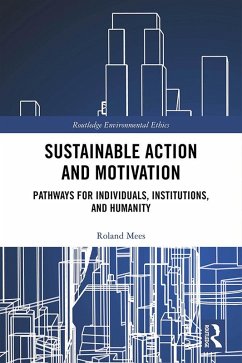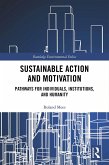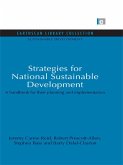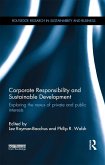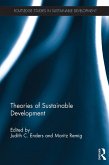Roland Mees
Sustainable Action and Motivation (eBook, ePUB)
Pathways for Individuals, Institutions and Humanity
42,95 €
42,95 €
inkl. MwSt.
Sofort per Download lieferbar

21 °P sammeln
42,95 €
Als Download kaufen

42,95 €
inkl. MwSt.
Sofort per Download lieferbar

21 °P sammeln
Jetzt verschenken
Alle Infos zum eBook verschenken
42,95 €
inkl. MwSt.
Sofort per Download lieferbar
Alle Infos zum eBook verschenken

21 °P sammeln
Roland Mees
Sustainable Action and Motivation (eBook, ePUB)
Pathways for Individuals, Institutions and Humanity
- Format: ePub
- Merkliste
- Auf die Merkliste
- Bewerten Bewerten
- Teilen
- Produkt teilen
- Produkterinnerung
- Produkterinnerung

Bitte loggen Sie sich zunächst in Ihr Kundenkonto ein oder registrieren Sie sich bei
bücher.de, um das eBook-Abo tolino select nutzen zu können.
Hier können Sie sich einloggen
Hier können Sie sich einloggen
Sie sind bereits eingeloggt. Klicken Sie auf 2. tolino select Abo, um fortzufahren.

Bitte loggen Sie sich zunächst in Ihr Kundenkonto ein oder registrieren Sie sich bei bücher.de, um das eBook-Abo tolino select nutzen zu können.
Sustainable Action and Motivation proposes individual competencies and institutional policies that can help overcome the motivational hurdles that hamper sustainable action.
- Geräte: eReader
- ohne Kopierschutz
- eBook Hilfe
- Größe: 0.49MB
Andere Kunden interessierten sich auch für
![Sustainable Action and Motivation (eBook, PDF) Sustainable Action and Motivation (eBook, PDF)]() Roland MeesSustainable Action and Motivation (eBook, PDF)42,95 €
Roland MeesSustainable Action and Motivation (eBook, PDF)42,95 €![Community Action and Climate Change (eBook, ePUB) Community Action and Climate Change (eBook, ePUB)]() Jennifer KentCommunity Action and Climate Change (eBook, ePUB)51,95 €
Jennifer KentCommunity Action and Climate Change (eBook, ePUB)51,95 €![Philosophy of Nature (eBook, ePUB) Philosophy of Nature (eBook, ePUB)]() Svein Anders LiePhilosophy of Nature (eBook, ePUB)48,95 €
Svein Anders LiePhilosophy of Nature (eBook, ePUB)48,95 €![After Sustainability (eBook, ePUB) After Sustainability (eBook, ePUB)]() John FosterAfter Sustainability (eBook, ePUB)51,95 €
John FosterAfter Sustainability (eBook, ePUB)51,95 €![Strategies for National Sustainable Development (eBook, ePUB) Strategies for National Sustainable Development (eBook, ePUB)]() Jeremy Carew-ReidStrategies for National Sustainable Development (eBook, ePUB)14,95 €
Jeremy Carew-ReidStrategies for National Sustainable Development (eBook, ePUB)14,95 €![Corporate Responsibility and Sustainable Development (eBook, ePUB) Corporate Responsibility and Sustainable Development (eBook, ePUB)]() Corporate Responsibility and Sustainable Development (eBook, ePUB)49,95 €
Corporate Responsibility and Sustainable Development (eBook, ePUB)49,95 €![Theories of Sustainable Development (eBook, ePUB) Theories of Sustainable Development (eBook, ePUB)]() Theories of Sustainable Development (eBook, ePUB)52,95 €
Theories of Sustainable Development (eBook, ePUB)52,95 €-
-
-
Sustainable Action and Motivation proposes individual competencies and institutional policies that can help overcome the motivational hurdles that hamper sustainable action.
Dieser Download kann aus rechtlichen Gründen nur mit Rechnungsadresse in A, B, BG, CY, CZ, D, DK, EW, E, FIN, F, GR, HR, H, IRL, I, LT, L, LR, M, NL, PL, P, R, S, SLO, SK ausgeliefert werden.
Produktdetails
- Produktdetails
- Verlag: Taylor & Francis eBooks
- Seitenzahl: 280
- Erscheinungstermin: 29. Oktober 2019
- Englisch
- ISBN-13: 9780429576430
- Artikelnr.: 58011597
- Verlag: Taylor & Francis eBooks
- Seitenzahl: 280
- Erscheinungstermin: 29. Oktober 2019
- Englisch
- ISBN-13: 9780429576430
- Artikelnr.: 58011597
- Herstellerkennzeichnung Die Herstellerinformationen sind derzeit nicht verfügbar.
Roland Mees studied fundamental mathematics at Utrecht University, business administration at the Rotterdam School of Management (Erasmus University), and philosophy in business at Utrecht University. Alongside his full-time job at ING, he obtained his PhD in 2017 at the Ethics Institute of Utrecht University, where he is an affiliated researcher. Mees is a director of Sustainable Finance at ING, based in Amsterdam, The Netherlands.
Preface
Introduction
Part I Problem, Method, and Case Material
Chapter 1 The Problem with Motivation for Sustainable Action
1.1 Sustainable Action - "What's in it for me?"
1.2 Understanding Sustainability and Sustainable Action
1.3 The Need for a Philosophy of Motivation for Sustainable Action
1.4 Meta-Ethics and the Problem with Motivation
1.5 The Problem with Motivation for Sustainable Action
Chapter 2 Methodological Considerations
2.1 Introduction
2.2 Collective, Institutional and Individual Responsibility
2.3 What We Can Learn from Psychology and its Methods
2.4 The Method of Investigating Motivation for Sustainable Action
2.5 The Rubicon Model of Action Phases
Chapter 3 The Case Study Material
3.1 Introduction
3.2 The Semi-Vegetarian
3.3 The Doctor Without Borders
3.4 The "Power Grid Rebels"
3.5 The Purchase Manager
3.6 The Credit Restructuring Officer
3.7 Programme of Part II
Part II A Conceptual-Phenomenological Analysis of the Rubicon Action Phases
Chapter 4 Motivational Challenges in the Deliberative Phase
4.1 Introduction
4.2 Exploring the Deliberative Phase
4.3 Sustainable Action and Common-Sense Morality
4.4 Sustainable Action and Practical Self-Understanding
4.5 Overview and Diagnosis
Chapter 5 Motivational Challenges in the Commitment Phase
5.1 Introduction
5.2 Exploring the Commitment Phase 5.3 The Need for Planning
5.4 The Belief that One will Follow Through
5.5 Commitment and Recognition
5.6 Overview and Diagnosis
Chapter 6 Motivational Challenges in the Executive Phase
6.1 Introduction
6.2 Reconsidering One's Intentions and Plans
6.3 Social Cooperation and Philosophy of Action
6.4 Self-Efficacy and Self-Control
6.5 Sustainable Action and Practical Identity
6.6 Overview and Diagnosis
Part III Pathways for Individuals, Institutions and Humanity
Chapter 7 Pathways for Individual Agents and Institutions
7.1 Introduction
7.2 Pathways for the Individual Agent
7.3 Pathways for Institutions
7.4 The Need for a Second-Order Commitment
Chapter 8
8.1 Introduction
8.2 A Bank as a Nexus of Legal and Ethical Relationships
8.3 Challenges Involving One's Commitment to a Sustainable Policy
8.4 Sustainable Action and Potential Change in the Banking Sector
Chapter 9 Moral Corruption and the Pathway for Humanity
9.1 Introduction
9.2 'Humanity' and Gardiner's Concept of Moral Corruption
9.3 Moral Corruption Based on the Descriptive Diagnosis
9.4 Moral Corruption and Our Self-Constitution as Agents
9.5 Consequences of Moral Corruption for Our Integrity
9.6 Two Kinds of Commitment to Take up Humanity's Challenge
Concluding Reflections
References
Introduction
Part I Problem, Method, and Case Material
Chapter 1 The Problem with Motivation for Sustainable Action
1.1 Sustainable Action - "What's in it for me?"
1.2 Understanding Sustainability and Sustainable Action
1.3 The Need for a Philosophy of Motivation for Sustainable Action
1.4 Meta-Ethics and the Problem with Motivation
1.5 The Problem with Motivation for Sustainable Action
Chapter 2 Methodological Considerations
2.1 Introduction
2.2 Collective, Institutional and Individual Responsibility
2.3 What We Can Learn from Psychology and its Methods
2.4 The Method of Investigating Motivation for Sustainable Action
2.5 The Rubicon Model of Action Phases
Chapter 3 The Case Study Material
3.1 Introduction
3.2 The Semi-Vegetarian
3.3 The Doctor Without Borders
3.4 The "Power Grid Rebels"
3.5 The Purchase Manager
3.6 The Credit Restructuring Officer
3.7 Programme of Part II
Part II A Conceptual-Phenomenological Analysis of the Rubicon Action Phases
Chapter 4 Motivational Challenges in the Deliberative Phase
4.1 Introduction
4.2 Exploring the Deliberative Phase
4.3 Sustainable Action and Common-Sense Morality
4.4 Sustainable Action and Practical Self-Understanding
4.5 Overview and Diagnosis
Chapter 5 Motivational Challenges in the Commitment Phase
5.1 Introduction
5.2 Exploring the Commitment Phase 5.3 The Need for Planning
5.4 The Belief that One will Follow Through
5.5 Commitment and Recognition
5.6 Overview and Diagnosis
Chapter 6 Motivational Challenges in the Executive Phase
6.1 Introduction
6.2 Reconsidering One's Intentions and Plans
6.3 Social Cooperation and Philosophy of Action
6.4 Self-Efficacy and Self-Control
6.5 Sustainable Action and Practical Identity
6.6 Overview and Diagnosis
Part III Pathways for Individuals, Institutions and Humanity
Chapter 7 Pathways for Individual Agents and Institutions
7.1 Introduction
7.2 Pathways for the Individual Agent
7.3 Pathways for Institutions
7.4 The Need for a Second-Order Commitment
Chapter 8
8.1 Introduction
8.2 A Bank as a Nexus of Legal and Ethical Relationships
8.3 Challenges Involving One's Commitment to a Sustainable Policy
8.4 Sustainable Action and Potential Change in the Banking Sector
Chapter 9 Moral Corruption and the Pathway for Humanity
9.1 Introduction
9.2 'Humanity' and Gardiner's Concept of Moral Corruption
9.3 Moral Corruption Based on the Descriptive Diagnosis
9.4 Moral Corruption and Our Self-Constitution as Agents
9.5 Consequences of Moral Corruption for Our Integrity
9.6 Two Kinds of Commitment to Take up Humanity's Challenge
Concluding Reflections
References
Preface
Introduction
Part I Problem, Method, and Case Material
Chapter 1 The Problem with Motivation for Sustainable Action
1.1 Sustainable Action - "What's in it for me?"
1.2 Understanding Sustainability and Sustainable Action
1.3 The Need for a Philosophy of Motivation for Sustainable Action
1.4 Meta-Ethics and the Problem with Motivation
1.5 The Problem with Motivation for Sustainable Action
Chapter 2 Methodological Considerations
2.1 Introduction
2.2 Collective, Institutional and Individual Responsibility
2.3 What We Can Learn from Psychology and its Methods
2.4 The Method of Investigating Motivation for Sustainable Action
2.5 The Rubicon Model of Action Phases
Chapter 3 The Case Study Material
3.1 Introduction
3.2 The Semi-Vegetarian
3.3 The Doctor Without Borders
3.4 The "Power Grid Rebels"
3.5 The Purchase Manager
3.6 The Credit Restructuring Officer
3.7 Programme of Part II
Part II A Conceptual-Phenomenological Analysis of the Rubicon Action Phases
Chapter 4 Motivational Challenges in the Deliberative Phase
4.1 Introduction
4.2 Exploring the Deliberative Phase
4.3 Sustainable Action and Common-Sense Morality
4.4 Sustainable Action and Practical Self-Understanding
4.5 Overview and Diagnosis
Chapter 5 Motivational Challenges in the Commitment Phase
5.1 Introduction
5.2 Exploring the Commitment Phase 5.3 The Need for Planning
5.4 The Belief that One will Follow Through
5.5 Commitment and Recognition
5.6 Overview and Diagnosis
Chapter 6 Motivational Challenges in the Executive Phase
6.1 Introduction
6.2 Reconsidering One's Intentions and Plans
6.3 Social Cooperation and Philosophy of Action
6.4 Self-Efficacy and Self-Control
6.5 Sustainable Action and Practical Identity
6.6 Overview and Diagnosis
Part III Pathways for Individuals, Institutions and Humanity
Chapter 7 Pathways for Individual Agents and Institutions
7.1 Introduction
7.2 Pathways for the Individual Agent
7.3 Pathways for Institutions
7.4 The Need for a Second-Order Commitment
Chapter 8
8.1 Introduction
8.2 A Bank as a Nexus of Legal and Ethical Relationships
8.3 Challenges Involving One's Commitment to a Sustainable Policy
8.4 Sustainable Action and Potential Change in the Banking Sector
Chapter 9 Moral Corruption and the Pathway for Humanity
9.1 Introduction
9.2 'Humanity' and Gardiner's Concept of Moral Corruption
9.3 Moral Corruption Based on the Descriptive Diagnosis
9.4 Moral Corruption and Our Self-Constitution as Agents
9.5 Consequences of Moral Corruption for Our Integrity
9.6 Two Kinds of Commitment to Take up Humanity's Challenge
Concluding Reflections
References
Introduction
Part I Problem, Method, and Case Material
Chapter 1 The Problem with Motivation for Sustainable Action
1.1 Sustainable Action - "What's in it for me?"
1.2 Understanding Sustainability and Sustainable Action
1.3 The Need for a Philosophy of Motivation for Sustainable Action
1.4 Meta-Ethics and the Problem with Motivation
1.5 The Problem with Motivation for Sustainable Action
Chapter 2 Methodological Considerations
2.1 Introduction
2.2 Collective, Institutional and Individual Responsibility
2.3 What We Can Learn from Psychology and its Methods
2.4 The Method of Investigating Motivation for Sustainable Action
2.5 The Rubicon Model of Action Phases
Chapter 3 The Case Study Material
3.1 Introduction
3.2 The Semi-Vegetarian
3.3 The Doctor Without Borders
3.4 The "Power Grid Rebels"
3.5 The Purchase Manager
3.6 The Credit Restructuring Officer
3.7 Programme of Part II
Part II A Conceptual-Phenomenological Analysis of the Rubicon Action Phases
Chapter 4 Motivational Challenges in the Deliberative Phase
4.1 Introduction
4.2 Exploring the Deliberative Phase
4.3 Sustainable Action and Common-Sense Morality
4.4 Sustainable Action and Practical Self-Understanding
4.5 Overview and Diagnosis
Chapter 5 Motivational Challenges in the Commitment Phase
5.1 Introduction
5.2 Exploring the Commitment Phase 5.3 The Need for Planning
5.4 The Belief that One will Follow Through
5.5 Commitment and Recognition
5.6 Overview and Diagnosis
Chapter 6 Motivational Challenges in the Executive Phase
6.1 Introduction
6.2 Reconsidering One's Intentions and Plans
6.3 Social Cooperation and Philosophy of Action
6.4 Self-Efficacy and Self-Control
6.5 Sustainable Action and Practical Identity
6.6 Overview and Diagnosis
Part III Pathways for Individuals, Institutions and Humanity
Chapter 7 Pathways for Individual Agents and Institutions
7.1 Introduction
7.2 Pathways for the Individual Agent
7.3 Pathways for Institutions
7.4 The Need for a Second-Order Commitment
Chapter 8
8.1 Introduction
8.2 A Bank as a Nexus of Legal and Ethical Relationships
8.3 Challenges Involving One's Commitment to a Sustainable Policy
8.4 Sustainable Action and Potential Change in the Banking Sector
Chapter 9 Moral Corruption and the Pathway for Humanity
9.1 Introduction
9.2 'Humanity' and Gardiner's Concept of Moral Corruption
9.3 Moral Corruption Based on the Descriptive Diagnosis
9.4 Moral Corruption and Our Self-Constitution as Agents
9.5 Consequences of Moral Corruption for Our Integrity
9.6 Two Kinds of Commitment to Take up Humanity's Challenge
Concluding Reflections
References
